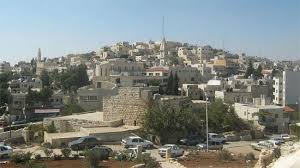Fr Bashar: Taybeh blockaded, under attack, the West Bank a ‘second Gaza'
The parish priest spoke to AsiaNews describing a climate of "impunity" among settler attacks and army closures. At least 10 local families fled to the United States in search of peace and security, not for economic reasons. Israeli forces are forcing closures in Tammoun and the al-Far'a refugee camp, cutting off water supplies and communications.
Milan (AsiaNews) – “We hope that what happened in Gaza will not be repeated in the West Bank" but “we are in the presence of fanatics,” said Fr Bashar Fawadleh, speaking to AsiaNews.
The clergyman serves as parish priest in Taybeh, a village in the West Bank, some 30 km north of Jerusalem, east of Ramallah. Home to about 1,500 residents and three churches, it is also the last Palestinian village inhabited entirely by Christians.
“We are Palestinians, we were born in this land, and we want to live here,” he explained. “We certainly do not want to leave, and will stay until the end. No one can kick us out and, as Palestinian Christians, we pray that one day these hurdles and hardships will be overcome.”
More than 600 residents are Latin Catholics, while the rest are Greek Orthodox or Greek Melkite Catholics, but settler attacks and army raids are pushing many to leave.
The settlers “are fanatics. We have never seen anything like this even during the Second Intifada” in the early 2000s. “We don't know what to do with this government of fanatics.”
Taybeh, the priest notes, is “a small town” with a small population, but it covers “a vast portion of territory”, about 24 square kilometres. “A good part is farmed, especially olive groves.”
In the last harvest season, Fr Bashar said, “there were constant attacks by settlers” who have targeted “lands and families, struck people and do not shy away from using firearms, although so far we have been lucky and have not had casualties.”
In recent months, settlers backed by the army have caused "enormous hardships". If one counts the numerous military checkpoints, a new “scenario is emerging, especially in the last 10 days.”
“We woke up one morning and found barriers at the entry points to Palestinian towns and villages in the West Bank,” Fr Bashar explained. “This is the first time here in Taybeh, it never happened since 1967 (when the Six-Day War broke out). Now there are checkpoints and controls everywhere.”
The connecting roads with Nablus, Ramallah and Jericho “are closed. We cannot move, the situation is difficult and there are many problems.”
Meanwhile, Israeli security forces stormed the Palestinian town of Tammoun and the al-Far'a refugee camp in Tubas Governatorate for the sixth consecutive day.
The WAFA agency reports that the military raided numerous homes in both areas, devastating property and subjecting residents to field interrogations and house searches.
Local sources say that the military presence is being reinforced with increasing destruction of infrastructure, roads and private property, as well as the blockade of access to both the town and the refugee camp, as well as the southern entrance to the city of Tubas.
A source in al-Far'a told AsiaNews that “the water has been completely cut off from the camp due to the destruction of the internal network” and “the occupation forces are preventing its repair”.
Some power lines "have been destroyed and their repair is prohibited," while “communications and the Internet inside the camp have been completely blacked out and it is not possible to talk to people inside. Many homes no longer have food, sanitary pads for women and diapers and milk for children.”
The soldiers have also evacuated "an entire residential block" owned by the al-Muslimi family with “more than ten houses, driving out residents and taking control of them, setting up military barracks inside.”
Finally, the source said that the army “has deployed snipers on buildings and shoots at everything that moves.”
Tammoun has been under a curfew for the past two days, while traffic in Al-Far'a has stopped due to troops patrolling the streets and alleys.
In addition, Israeli soldiers are deliberately preventing doctors and journalists from doing their jobs in both areas, causing shortages of essential drugs, particularly for the chronically ill, and food supplies for many families left without food.
“No water, no Internet, roads cut off, infrastructure destroyed” are the daily reality today in the West Bank. “Attacks have increased with the war in Gaza. The conflict in the Strip has created a totally new scenario,” especially since two government ministers come from the settlements.
The former Minister for National Security Itamar Ben-Gvir, who recently quit over the ceasefire agreement in Gaza with exchange of prisoners with Hamas, and Finance Minister Bezalel Smotrich.
“They do not want Palestinians live in their own land,” the priest explained. Since 7 October 2023, "we have lost 10 families, who emigrated to the United States not for lack of work or low wages, but only to seek peace and security. This is the point: there is no underlying economic factor because here we have work and good salaries, at least before the war.”
However, “We no longer know how to defend ourselves from these attacks, which are carried out by the settlers in a climate of impunity. On the contrary, they are backed by the army, and there is no longer any difference between the two.”
27/02/2023 19:15
14/05/2024 18:57








.png)










